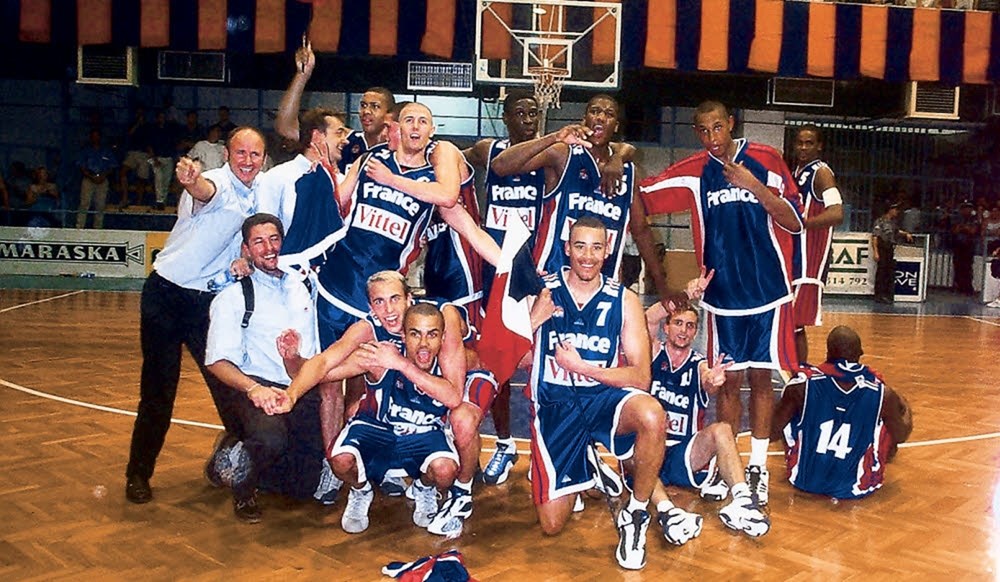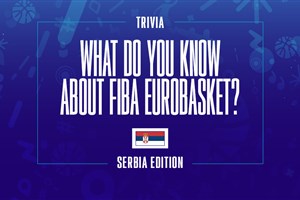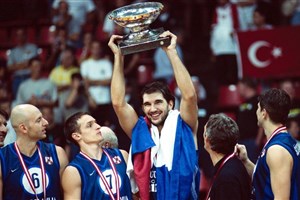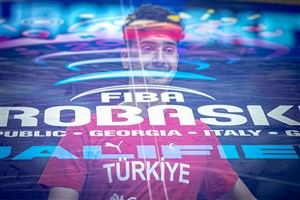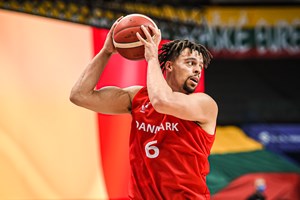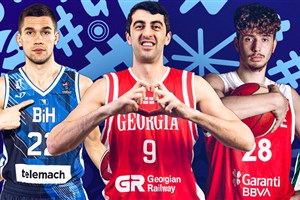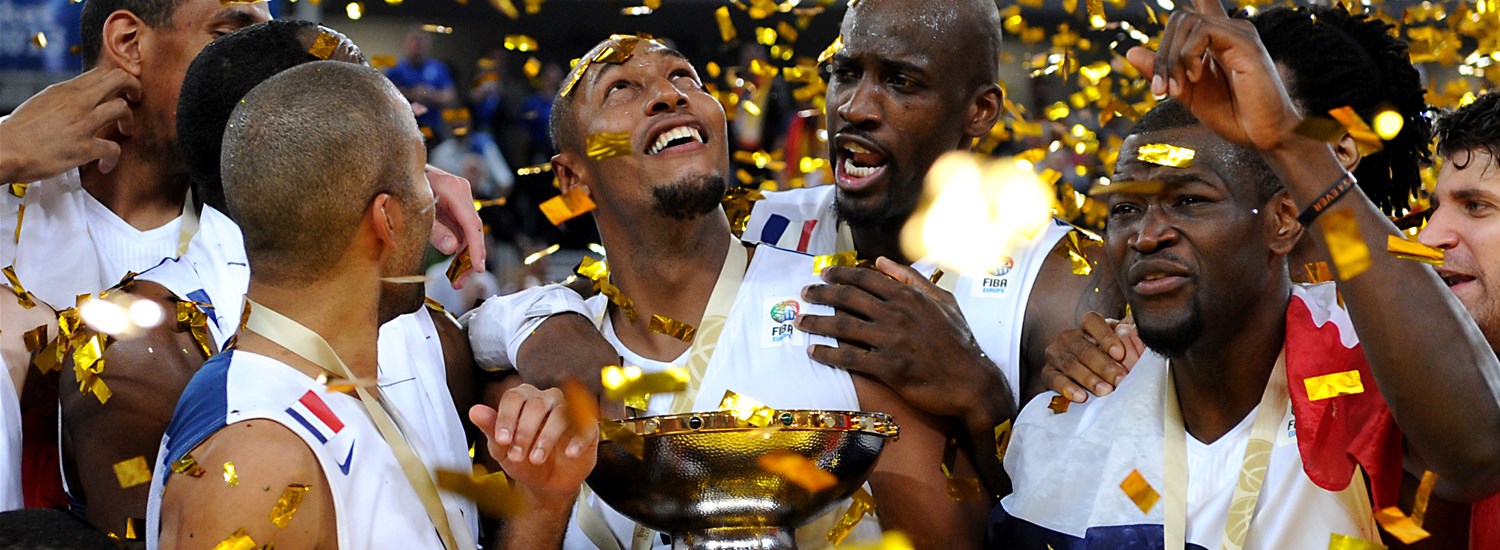
The story of Boris Diaw: Love spark in Zadar, sparkling gold in Ljubljana
MUNICH (Germany) - It takes thousands of practices, it takes millions of shots and dribbles. It takes a whole lot of damage to your body. And in the end, it can be summed up in a single word.
"Relief."
That's how Boris Diaw felt when he held the Nikolai Semashko Trophy in his hands for the first time, back in 2013.
Talking to FIBA.basketball seven years later, the French legend sounded at peace with his national team career, knowing he played his role in getting Les Bleus their first ever FIBA EuroBasket gold medal.
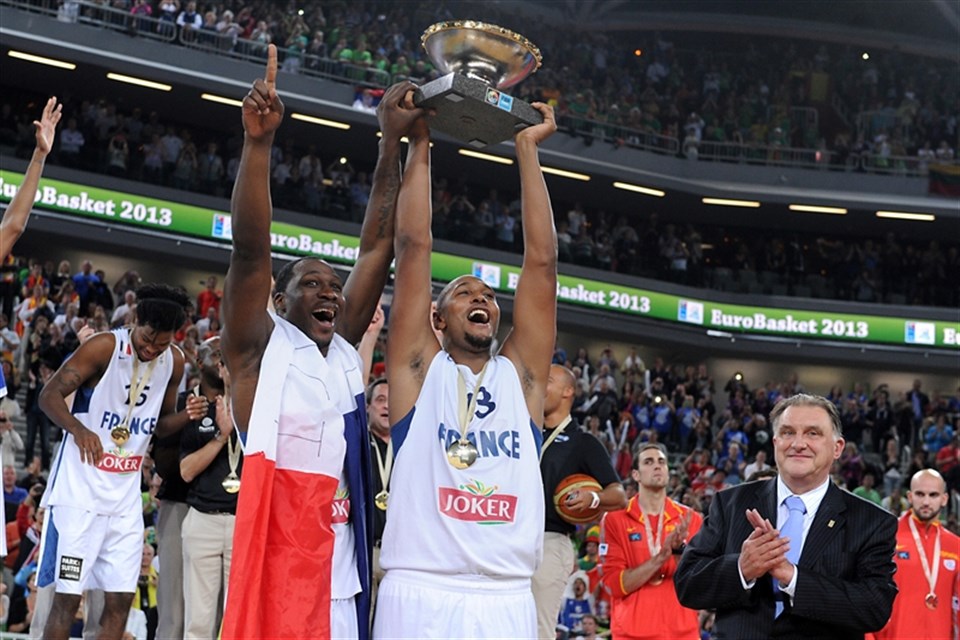
"It was just a relief. A relief because we were finally able to get the title, after so many years that we came close to winning. A relief because that was what we had been working for and practicing like 10 years before the title, just trying to get better and learning from our defeats, and in 2013 we were finally able to get to the top," Diaw said.
France were close to the top just two years earlier, losing out to Spain in arguably one of the best FIBA EuroBasket Finals of all time. The two would meet again in the Semi-Finals in Slovenia, and Spain were the ones in charge for most of the game. As Jose Calderon drove to the baseline and found a cutting Rudy Fernandez for an and-one dunk, the lead rose to 60-53 with just over five minutes to play in the Semi-Final.
But, Florent Pietrus - the man who committed the foul on Fernandez on the previous play - stopped the bleeding. At 60-53, with five minutes to play, the big man attempted his first three-pointer of the summer. First three-pointer attempted in 10 games in Slovenia. In fact, Florent Pietrus' last made three-pointer before that attempt against Spain was for Valencia, away at Lagun Aro GBC on January 12, 2013!
And even though Pietrus hadn't made a three-pointer in an official basketball game in eight months, Diaw says that nobody doubted his shot in the FIBA EuroBasket 2013 Semi-Finals.
"We knew he could make three-pointers. We knew he could shoot, we've seen him do it in practice all the time. He is a perfect role player, he can play defense, but we all knew he had a good shot, too. When he took that three-pointer, we weren't surprised, we were all confident that he could make it," Boris remembered the moment. Of course he did, he was the one who passed the ball to Pietrus for that triple.
The rest is, as the stereotypical saying goes, history. Pietrus' only three-pointer of the event cut the gap to 60-56, Diaw then dished out another assist, an extra pass to the corner for a Nicolas Batum triple, and the stage was set for Tony Parker to do his thing, force overtime and eventually send France to the Final.
As much as the win over Lithuania in the title game was big, finally getting over the Spanish hurdle must have felt good. It must have felt like relief.
"The year before Spain beat us, in the 2012 Olympics. The year before that, they beat us in the (FIBA EuroBasket) Final in Lithuania. And those were the Spanish teams that we couldn't really beat, they were better than us. Even though we always felt close to them. We knew 2013 would be our chance. In 2009, they were a far better team than us. Even in the 2011 Final, we just weren't ready for that level. And in 2012 they also beat us in a big game, so we were just really ready for 2013, we knew we had a chance," Diaw described what is arguably the biggest European rivalry of the new millennium.
But before he got a chance to lift the trophy, before the Final against Lithuania, and before the Spanish drama in the Semis, Diaw and France had to do what they do best. Defeat the home team, silence the crowd in a crucial game, as they faced Slovenia in the Quarter-Finals in front of a capacity crowd in Stozice, Ljubljana.
Merci "Bobo" 🇫🇷🏆🙇! #EuroBasket
— FIBA (@FIBA) September 7, 2018
👉 https://t.co/UBOuWUex4W@nicolas88batum @theborisdiaw @tonyparker@FRABasketball 🇫🇷 pic.twitter.com/U5btSm4Lje
"It's crazy, we always play our best against the hosts. Like, just think about Serbia and Montenegro in Novi Sad in 2005... Nobody expected us to defeat them. In Lithuania, we defeated their team in 2011, in the Second Round. Slovenia in 2013. Even Spain in 2014. Just seems that we enjoying playing those big teams when they are at home, we see it as a good matchup because we don't have the pressure that they have in such a game."
And yet, while enjoying the silence so much when they defeat the hosts, France could not prevent the same thing happening to them in 2015. Against Spain, of course, in the Semi-Finals. France won another medal, finished third, but...
"It was definitely bittersweet. It wasn't sweet. We wanted to win another gold, especially because we just won the previous event, and because we wanted to stay at the top for a few years. But it's definitely much harder to play at home in those games. We were so close to defeating Spain, again, and I don't think anybody was happy with just finishing third, even though it was a good result for French basketball in general."

Gold in Slovenia in 2013, bronze in Serbia and Montenegro in 2005... It seems like playing in a Balkan setting has suited France.
"We always enjoyed playing there. Even when we played exhibition games in Serbia, there was always a great crowd and they treated us with a lot of respect," Diaw explains.
But another country in that part of the continent provided France the cornerstone for success. It was in Croatia where the French story began, with a gold in Zadar in the FIBA U18 European Championship in 2000.
"That's where it all started. Because with that gold, we found love for national team basketball, love for playing for our country. I don't think we would have had that same feeling at the senior level if we hadn't won in youth basketball events. It would've been just like playing another game for your club. But winning at youth level, those were some great memories, and it got us looking forward to playing for the national team throughout all our careers. I remember the night we won in 2000, that night we said, 'okay, we now have to do this on senior level, too!' It took us 13 years (laughs), but we finally did it," Diaw said.
France certainly enjoyed the growth from 2000 onwards. Second place at the 2000 Summer Olympics, followed by a Semi-Finals appearance at the FIBA EuroBasket 2003, followed by a third-place finish in 2005, followed by a second-place finish in 2011, followed by gold in 2013, bronze at the FIBA Basketball World Cup 2014, bronze at FIBA EuroBasket 2015 and lastly bronze at the FIBA Basketball World Cup 2019.
"IT ALL STARTED IN ZADAR IN 2000. WE SAID WE HAVE TO DO IT ON SENIOR LEVEL, TOO. IT TOOK US 13 YEARS, BUT WE DID IT."
Diaw, now acting as the assistant general manager for the French national team, says that France are far from done in their silverware collection.
"Right now, we've got a lot of young and talented players. The last World Cup showed that, and we proved that we can be there, we can beat the big teams. I mean, we defeated USA in the Quarter-Finals. I think we are doing a good job, especially when it comes to developing players. We've got a bright future for sure."
FIBA
